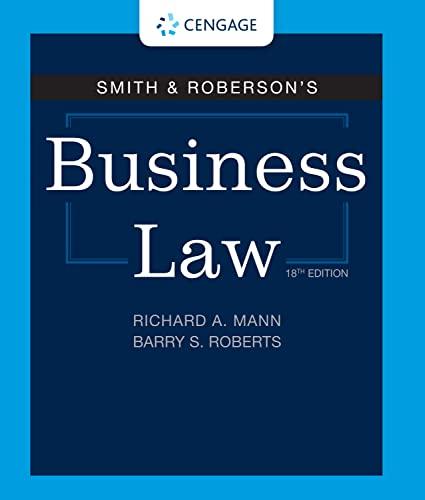Question
1.The author of a work is considered the copyright owner except: a. When the author forgets to put a copyright notice on the work after
1.The author of a work is considered the copyright owner except:
a. When the author forgets to put a copyright notice on the work after March 1, 1989.
b.When the work is a work made for hire by an employee working within the scope of their employment.
c. Where the Copyright Office rejects the application because it is incomplete.
d. All of the above.
e. None of the above.
2. Under the current 1976 Copyright Act, a corporation's copyright lasts:
a.95 years from publication.
b.120 years from creation.
c.the shorter of a and b.
d. none of the above.
e. the shorter of 47 years after renewal or 75 years from creation.
3. A copyright owner may obtain the maximum protection from their copyright by:
a.filing the appropriate form with the Copyright Office in Washington, D.C.
b.registering his work within 90 days of the date of first publication.
c.registering his work within 5 years of the date of first publication.
d.all of the above.
e.paying a good lawyer a small fortune.
4. In Desney v. Wilder the plaintiff had dictated a story synopsis over the phone to a secretary of a well-known Hollywood producer/director. The court took great pains to underscore the principal that copyrights do not protect ideas. In analyzing whether or not the case should have been decided on the basis of summary judgment, the Appeals Court concluded that the case should be returned to the lower court on which of the following grounds?
a.that the story lines between the plaintiff's synopsis and the defendant's eventual film were too close to simply be coincidence.
b.that Mr. Wilder's secretary had promised that the plaintiff would receive a specific sum of money if the film was produced.
c. on the basis that the parties could have reached an implied-in-fact contract that Mr. Wilder would pay the plaintiff if he used the plaintiff's story.
d.that the story of a man trapped in a cave was part in the public domain as it had been part of a well-known recent newsworthy event.
e.none of the above.
Step by Step Solution
There are 3 Steps involved in it
Step: 1

Get Instant Access to Expert-Tailored Solutions
See step-by-step solutions with expert insights and AI powered tools for academic success
Step: 2

Step: 3

Ace Your Homework with AI
Get the answers you need in no time with our AI-driven, step-by-step assistance
Get Started


